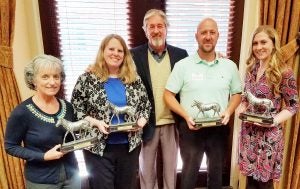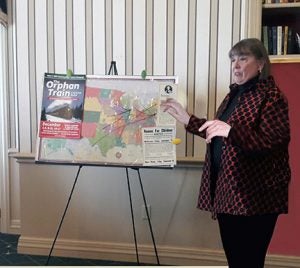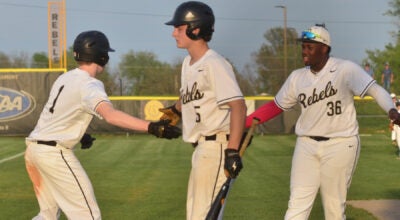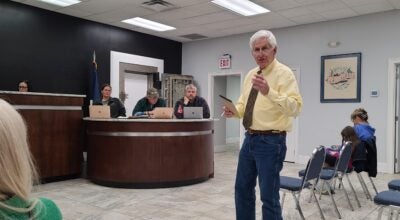Business news, Nov. 29
Published 8:27 am Wednesday, November 29, 2017
Landmark Trust to present awards
Boyle Landmark Trust will host its annual meeting and awards presentation, Sunday, Dec. 10 from 3 to 5 p.m. in Jacobs Hall on Kentucky School for the Deaf campus, 303 S. Fourth Street. Committee reports will be followed by the annual awards presentations. A tour of Jacobs Hall will also be available. Light refreshments will be served. Sponsors are Barbara Hulette, Carol Seidel, Jeannette Stone and The Hub Coffee House and Cafe. The meeting is open to the public.
Ephraim McDowell Health Marketing Department wins statewide awards
The Ephraim McDowell Health Marketing Department has been recognized with six awards from the Kentucky Society of Healthcare Public Relations and Marketing (KSHPRM). Four of the awards were the prestigious Thoroughbred Award that were received for the categories of television advertising, social media content, poster/exhibit and special purpose publication. The Thoroughbred Award is the highest health care marketing award in the state, and is designed to recognize Marketing/Public Relations departments that achieve excellence in a variety of categories.
In addition to the Thoroughbred Awards, two Certificates of Merit were earned by the EMH marketing team in the categories of direct mail and total advertising campaign.

Pictured left to right are Maleena Nevels, Jacquie Peterson, Keith Bridges, Jeremy Cocanougher and Jessica Mills.
Shoe store offering discounts for donations
Shoe Sensation in the Danville Manor Shopping Center will be helping to support the Salvation Army from 3:30-7 p.m. Friday, Dec. 1. Every shopper who donates to the Salvation Army will receive a 20 percent off coupon. There will also be snacks and selfies with Santa available.
The store is also collecting new socks for active military and local veterans in and around the community with its Socks for Troops drive which runs now until Dec. 24.
Kidd promoted to correctional sergeant at Northpoint Training Center
BURGIN – Steven Kidd, of Liberty, was promoted to the position of correctional sergeant on November 16, at Northpoint Training Center.
He began his employment at Northpoint Training Center as a correctional officer in February 2013.
Dollar General opens in Liberty
Major discount retailer will celebrate the grand opening on Saturday, Dec. 2
Dollar General’s newest store at 11716 South Ky. 501 in Liberty is now open. In its new location, Dollar General will offer area residents a convenient new place to shop for everyday essentials at low prices.
Dollar General will celebrate the store’s official grand opening on Saturday, Dec. 2 at 8 a.m. with free prizes and special deals. Additionally, the first 50 adult shoppers at the store will receive a $10 Dollar General gift card and the first 200 shoppers will receive a Dollar General tote bag with complimentary product samples, among other giveaways.
Playwright Orndorff tells Rotary the story behind ‘The Orphan Train’
Story and photo by DAVE FAIRCHILD
Rotary Club of Danville

Liz Orndorff talks about her new play, “The Orphan Train” with Danville Rotary members.
On Friday, Nov. 10, Liz Orndorff told Rotary Club the story behind her new play, “The Orphan Train.”
The play opens the first two weekends (Dec. 1-3 and Dec. 9-10) of December at the West T. Hill Community Theatre in Danville.
Norfolk Southern has agreed to sponsor the play. And Orndorff hopes that they will come and see play too, because it’s another example of the local industry supporting the arts here in Danville.
“A lot of people don’t know about the Orphan Train and the role it played in American history. So I thought I would share some of the story with you all today. Then you can come see the play and get the ‘rest of the story!’” Orndorff said.
In 1853, a Calvinist minister from Connecticut, Charles Loring Brace, moved to New York City at the age of 26. He became overwhelmed by the plight of the street children, often called them “Street Rats.”
In 1850, New York City had a population of 500,000 and 30,000 kids lived on the street. They were abandoned. Their parents were drug addicts, often dying of malaria, or influenza or measles. The poverty was so rampant, that the parents couldn’t take care of their children. Many simply abandoned them. The kids lived in little gangs to protect each other. They sold matches and newspapers and literally lived in the streets.
So in 1853, Mr. Brace started the first boys’ runaway shelter called the News Boys’ Lodging House. They could come there and get a meal, some rudimentary education and have a place to stay. He also tried to find placements for these boys in good families who didn’t live in New York City. For example, he looked in farms in New Jersey or up near Philadelphia. Mr. Brace started placing them one-by-one, and was soon overwhelmed by the number of kids needing placement.
In 1954, he got the idea to get a whole bunch put them on a train and head away from the large eastern cities into the more favorable environs of the Midwest. His reasoning was simple: the Midwest had land; and it had a healthful environment; and farmers were always looking for help.
In 1854, the first train was so successful that they continued for 75 years. Subsequent trains went as far as into Canada and even into Mexico. The Children’s Aid Society kept contact, and once a year they would contact an orphan and ask, ‘How’s it working?’ Sometimes the response would be, ‘I want to go home. I want to go back to New York.’ When that occurred, they were returned to New York. In general, 87-percent of the kids — they were happy. In all, 200,000 children were shipped from New York City to other parts of the United States.
About 200 orphans came to Kentucky, according to the Children’s Aid Society, which was Brace’s organization. Orndorff contacted them after deciding to write a play. She asked questions like “What trains came to Kentucky and where did they stop? How many children came to Kentucky?’” The information received was limited, because of the need to protect the privacy of the orphans and their adopted parents.
The play starts with an advance man who sends an ad. It is set in 1917 because it was within the time period, and also because one of her favorite songs, “Over There” by George M. Cohan, and that was the No. 1 song in 1917. The play has the kids beating little drums and singing “Over There.” That’s how playwrights make decisions, she said.
In the play, the orphans come into a hotel. Candidate parents have been gathered. The audience meets the children. By the end of Act Two, match-ups and the interviews have occurred. The hardest placements are the older teenage boys. So that’s the setting and the background for her play “The Orphan Train.”
Orndorff hopes everyone will want to see the musical, sponsored by Norfolk Southern, to hear “…the rest of the story…”






